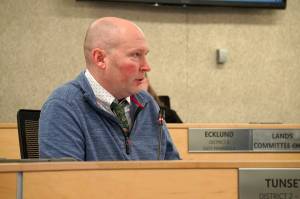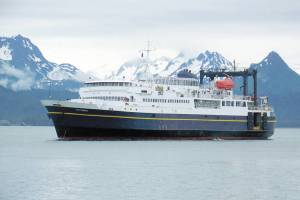Walker’s tax proposals land with thud in Alaska Legislature
Published 4:22 am Friday, May 27, 2016
JUNEAU, Alaska — Gov. Bill Walker’s newly repackaged tax proposals have landed with a thud in the Alaska Legislature, with criticism over having all the pieces rolled together and questions about the overall impact.
Rep. Les Gara, D-Anchorage, said rolling them into one package is almost like a recipe to fail, since someone might support one piece but not another. Sen. Mia Costello, R-Anchorage, asked Revenue Commissioner Randall Hoffbeck why bother with this, noting the package would only address a small portion of the estimated multibillion-dollar state deficit.
Every bit helps, Hoffbeck said, adding that Walker “wanted to spread the burden of balancing the budget in as many ways as he possibly could.” Hoffbeck said legislators could break the pieces out again during the special session but treating them as a package provides an opportunity to consider them as a whole.
The package, as proposed, would raise about $345 million by fiscal year 2019, when all the pieces are fully implemented.
The biggest piece of Walker’s plan for addressing the deficit calls for structured, annual draws from Alaska Permanent Fund earnings to help pay for state government. That’s addressed in a separate bill pending during the special session.
The measure and the tax proposals were all introduced separately during the regular session. During the regular session, there was some reluctance among legislators to vote for a tax increase on one group without knowing whether other taxes would go forward.
The House Finance Committee’s Friday meeting agenda suggested an interest in breaking out some of the tax pieces, featuring yet-to-be-introduced separate bills related to mining, fisheries and motor fuels taxes.
Here is a look at Walker’s tax proposals, based on information from the Revenue Department.
—INCOME: This would be 6 percent of the amount in taxes you pay the federal government; for people who itemize, it would be deductible from the federal income tax. The department says up to 30 percent of Alaskans will have no liability.
The department estimates it would raise $100 million in fiscal year 2018 and $205 million the following year, gradually increasing. It’s the largest tax piece and perhaps the most contentious.
The department has requested $500,000 to begin planning for how to implement the tax and expects to request additional implementation funds later. Alaska’s previous income tax was repealed in 1980.
—MOTOR FUELS: Tax rates would rise for highway, marine and jet fuel and aviation gas. Highway fuel taxes would double to 16 cents a gallon and represent the first increase to that tax rate since 1970. Someone driving 12,000 miles a year in a vehicle getting 20 miles to the gallon would pay an extra $48, the department says. The increases would generate an additional $43 million annually.
—CIGARETTES AND TOBACCO: The tax on a pack of cigarettes would rise by $1 and a new tax would be levied on electronic smoking products. Alaska would have one of the highest cigarette tax rates in the country, the department says.
The department estimates additional annual revenue of $25 million to $30 million over the next few years and says about $2 million would go toward tobacco education and cessation efforts.
—ALCOHOL: Proposed increases equate to 10 cents per drink and would give Alaska the highest alcohol tax rate in the country “by a substantial margin,” according to a department presentation. The increase would raise around $40 million a year with about half going to an alcohol and drug abuse fund, the department says.
—MARIJUANA: The bill would expand applicability of the current marijuana tax, allowing for it to be assessed on retailers selling pot that’s not from a licensed grower or on illegal grow operations. This wasn’t one of Walker’s initial proposals but incorporated from a House bill. The department can’t say how much money it might raise.
—MINING AND FISHING: The proposed mining tax changes would generate about $7 million annually initially, while the fishing industry tax increases would raise about $18 million to start.
The fisheries taxes, while generally paid by processors, are likely to be passed on to fishermen, the department said.




